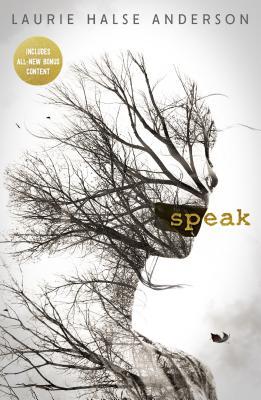In spite of having surgery today, I am going to get out an IMWAYR post this week because I have just read so much amazing stuff! Speak by Laurie Halse Anderson is an incredible book that I first need to mention comes with content warnings for sexual assault, self harm. These are difficult and yet necessary topics to discuss with young adults - they are sadly a reality for many youth these days and need to be discussed in classroom in supportive ways.
Anderson, Laurie Halse (1999). Speak. New York: Farrar Straus Giroux.
The book itself includes resources for youth needing support related to sexual assault, though they are USA centered. The first thing I recommend if you are going to discuss this book in a classroom setting is gathering resources that are local and useful to students in your class. Chances sadly pretty high that someone in that class will need these resources.
Laurie Halse Anderson talks a little about why she wrote the book and I related greatly with what she said about depression in high school. I struggled quite a bit with undiagnosed depression and it partly manifested itself in the form of silence and social anxiety. My own experiences were definitely mild compared with those of Melinda (the protagonist in Speak) and with those of many teens out there who have opened up and shared their stories with Anderson after publishing the book.
At the end of the book, Anderson mentions some reactions that students have had to reading the book and hurt me the most to hear were the questions she received from some boys asking some variation of "why is rape so bad?" As a woman, I thought the answer to this question was self-evident, but there is a reason there are so many rape apologists in the world right now. This book is a good place to start creating empathy in boys for people (of all genders) who have been sexually assaulted, but the conversation needs to continue from there.
As a former museum educator, I have come across a way to discuss difficult topics known as dialogic interpretation. It is meant to facilitate conversations between those with differing opinions (learn more about it here). It seems to me that bringing dialogic interpretation into the classroom would be a good way to discuss this book, and I came across dialogic teaching. Prestwick House also has some tips on teaching Speak in the classroom. Portland Public Schools also has a great unit plan for studying this book with a class.
This was a moving read that reveals itself in layers and I highly recommend it for personal or classroom reading.
Anderson, Laurie Halse (1999). Speak. New York: Farrar Straus Giroux.
The book itself includes resources for youth needing support related to sexual assault, though they are USA centered. The first thing I recommend if you are going to discuss this book in a classroom setting is gathering resources that are local and useful to students in your class. Chances sadly pretty high that someone in that class will need these resources.
 |
| Laurie Halse Anderson's Speak. Book cover care of goodreads.com |
Interview on Speak with Laurie Halse Anderson
At the end of the book, Anderson mentions some reactions that students have had to reading the book and hurt me the most to hear were the questions she received from some boys asking some variation of "why is rape so bad?" As a woman, I thought the answer to this question was self-evident, but there is a reason there are so many rape apologists in the world right now. This book is a good place to start creating empathy in boys for people (of all genders) who have been sexually assaulted, but the conversation needs to continue from there.
As a former museum educator, I have come across a way to discuss difficult topics known as dialogic interpretation. It is meant to facilitate conversations between those with differing opinions (learn more about it here). It seems to me that bringing dialogic interpretation into the classroom would be a good way to discuss this book, and I came across dialogic teaching. Prestwick House also has some tips on teaching Speak in the classroom. Portland Public Schools also has a great unit plan for studying this book with a class.
This was a moving read that reveals itself in layers and I highly recommend it for personal or classroom reading.
Comments
Post a Comment